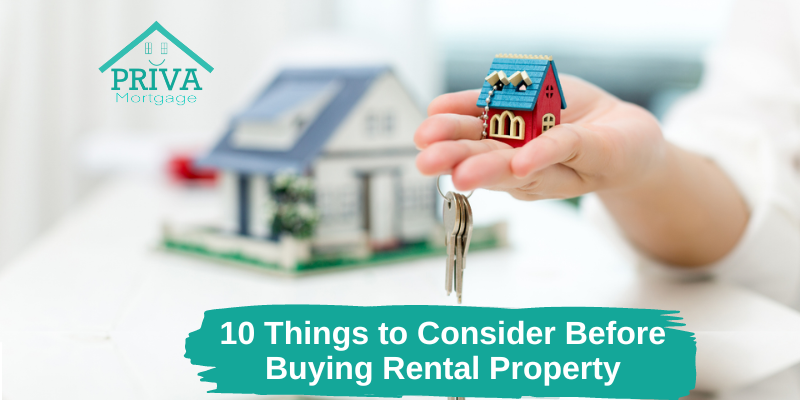Buying rental property can be a great investment when done right. But, like any investment, there are risks and rewards. There’s always a chance you can lose money, but there’s a good chance you can make money too.
Knowing where to invest in real estate, what to buy, and managing it properly can help you earn the most benefits from a rental property. When buying your first or fifth investment property, it’s important to understand certain factors before investing your money.
Why Invest in Rental Real Estate?
Investing in real estate is a great way to diversify your investments. Rather than relying on the risky stock market, you can park some of your capital in a home that collects monthly rent. As a result, you’ll have regular monthly income and earn capital gains on the property when you sell it.
Rental property can be a passive form of income if you hire a property management company or somewhat active if you act as a landlord. Either way, it’s a great way to supplement your income and grow your net worth.
Many people add real estate to their portfolios to diversify the risk of investing in the stock market. With your money in multiple baskets, you can reduce your risk of a total loss.
What you Must Know Before Buying Rental Property
Before buying a rental property, it’s important to consider certain factors. While they may not affect everyone, knowing the best and worst-case scenarios is important.
- You are responsible for all maintenance and repairs on the property. If you operate as a landlord, you are on call 24/7 and must help tenants with any issues.
- You are responsible for the mortgage payment even if you don’t have tenants. So make sure to take on a mortgage you know you can afford even if there isn’t rental income.
- You earn all the capital gains on the property as it appreciates. You can tap into the equity by refinancing or selling the property and get the profits.
- You may have to deal with bad tenants. Even if you screen tenants carefully, there’s always a risk you’ll have bad tenants.
- It can be more difficult to get financing. You’ll need an investment property mortgage which is riskier for lenders. At Priva Mortgage, we work with lenders that offer investment property mortgages with varying requirements. We can help you find the right lender.
Understanding the Income on Rental Properties
Rental income isn’t guaranteed, but it’s a nice perk when you buy a rental property. Before buying a rental property, do some research. Find out the demand for rentals in the area and the average rent earned.
To determine if a property is worth buying, consider the 1% rule, which states your gross monthly income should be 1% of the property’s sales price.
For example, if you bought a rental property for $200,000, it only makes sense if you can earn $2,000 in rental income.
This doesn’t mean you’ll keep $2,000 each month because you must figure your expenses into the cost, such as the mortgage, taxes, insurance, maintenance, and repairs. However, the $2,000 should be enough to cover those expenses and leave you with some profits.
If it’s not, the investment isn’t worth it.
When you look at rental properties, keep in mind that you might have vacancies. Determine the average vacancy period in the area you’re considering renting and figure it into your projected income, so you’re prepared.
Rental Property Expenses
Owning a rental property means you’ll face many operational and capital expenses.
Operational expenses are costs you incur to operate the property, such as:
- Property taxes
- Homeowner’s insurance
- Maintenance
- Repairs
- Vacancy costs
- Property management costs (tenant screening, rent collection, etc.)
Capital expenses are any expenses you didn’t expect, such as a burst pipe or the water heater stopping working. Capital expenses are usually high and unexpected but should be covered with an emergency fund.
Overall, your expenses should cost around 50% of your rental income annually. The property may not be the right choice if it’s much higher.
Rental Property ROI
Everyone has a different threshold for their return on investment (ROI), plus each investor uses different metrics.
The most common measurement is the cash-on-cash return, which you calculate by subtracting your expenses from your gross annual income. Next, divide that number by the property purchase price. This gives you the cash-on-cash return, which should be between 8% – 11% for the best results.
Pros And Cons Of Buying Rental Property
Like any investment, there are pros and cons of buying rental property. Understanding both sides can help you make the right decision
Pros:
- You can earn passive income when you have tenants
- You may earn capital gains if your property value increases
- You may be eligible for tax deductions as real estate investments are treated like a business
- You diversify your portfolio
Cons:
- You may have vacancies but still, be responsible for the home’s costs
- You may have to deal with bad tenants that don’t pay their rent
- There’s no guarantee your property value will increase
- You may not earn enough income to cover the costs
Bottom Line
Buying rental property can be a great investment. But before you jump in headfirst, do your research. Know which areas have the most profitable rental properties and how much you can charge.
Also, think about what you can handle as a landlord. Will you pay a property management company or handle it yourself? Consider the key factors and if you decide buying a rental property fits your needs, contact Priva Mortgage today, and let’s get you started on your financing.







